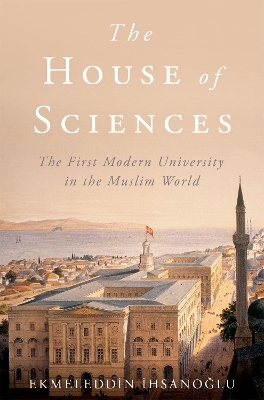
The House of Sciences
The First Modern University in the Muslim World
Seiten
2019
Oxford University Press Inc (Verlag)
978-0-19-005155-6 (ISBN)
Oxford University Press Inc (Verlag)
978-0-19-005155-6 (ISBN)
The book examines the founding of a western institution, a university, in the Ottoman Empire, a cultural environment wholly different from that of its place of origin in Western Europe.
Following a string of military defeats at the end of the eighteenth century, Ottoman leaders realized that their classical traditions and institutions could not compete with Russia and the European states' technological and economic superiority.One of a series of nineteenth-century reform initiatives was the creation of a European-style university called darülfünun. From the Arabic words dar, meaning "house," and fünun, meaning "sciences," the darülfünun would incorporate the western sciences into deeply entrenched academic traditions and institutions in an effort to bridge the gap with Europe. The completely new institution, distinct from the existing pre-modern medreses, was modeled after the French educational system and created an infrastructure for national universities in Turkey and some of the Arab-speaking provinces. It also influenced the establishment of universities in Iran and Afghanistan.
Ekmeleddin Ihsanoglu's study sheds new light on an important and pioneering experiment in East-West relations, tracking the multifaceted transformation at work in Istanbul during the transition from classical to modern modes of scientific education. Out of this intellectual ferment, a new Ottoman Turkish scientific language developed, the terminology of which served as a convenient vehicle for expressing and teaching modern science throughout the Empire.
Following a string of military defeats at the end of the eighteenth century, Ottoman leaders realized that their classical traditions and institutions could not compete with Russia and the European states' technological and economic superiority.One of a series of nineteenth-century reform initiatives was the creation of a European-style university called darülfünun. From the Arabic words dar, meaning "house," and fünun, meaning "sciences," the darülfünun would incorporate the western sciences into deeply entrenched academic traditions and institutions in an effort to bridge the gap with Europe. The completely new institution, distinct from the existing pre-modern medreses, was modeled after the French educational system and created an infrastructure for national universities in Turkey and some of the Arab-speaking provinces. It also influenced the establishment of universities in Iran and Afghanistan.
Ekmeleddin Ihsanoglu's study sheds new light on an important and pioneering experiment in East-West relations, tracking the multifaceted transformation at work in Istanbul during the transition from classical to modern modes of scientific education. Out of this intellectual ferment, a new Ottoman Turkish scientific language developed, the terminology of which served as a convenient vehicle for expressing and teaching modern science throughout the Empire.
Ekmeleddin Ihsanoglu is a Turkish scholar and diplomat. He was the founder and chair of the first Department of the History of Science in Turkey at the University of Istanbul and has taught at the universities of Ankara, Exeter, Istanbul, and Munich. He is the founder of the IRCICA, the Turkish Society for the History of Science, and the International Union of history and Philosophy of Science (2001-2005). His written works include Turks in Egypt and Their Cultural Legacy, Scientific Technology and Learning in the Ottoman Empire, and The Islamic World in the New Century. A member of the Turkish Parliament and the Parliamentarian Assembly of the Council of Europe, Ihsanoglu was a candidate for president of the Republic of Turkey in 2014.
| Erscheinungsdatum | 12.07.2019 |
|---|---|
| Verlagsort | New York |
| Sprache | englisch |
| Maße | 239 x 157 mm |
| Gewicht | 567 g |
| Themenwelt | Geisteswissenschaften ► Archäologie |
| Geschichte ► Allgemeine Geschichte ► Neuzeit (bis 1918) | |
| Geisteswissenschaften ► Geschichte ► Regional- / Ländergeschichte | |
| Sozialwissenschaften ► Pädagogik ► Allgemeines / Lexika | |
| ISBN-10 | 0-19-005155-8 / 0190051558 |
| ISBN-13 | 978-0-19-005155-6 / 9780190051556 |
| Zustand | Neuware |
| Haben Sie eine Frage zum Produkt? |
Mehr entdecken
aus dem Bereich
aus dem Bereich
Europa 1848/49 und der Kampf für eine neue Welt
Buch | Hardcover (2023)
DVA (Verlag)
48,00 €
Giordano Bruno - ein ketzerisches Leben
Buch | Hardcover (2024)
C.H.Beck (Verlag)
29,90 €


